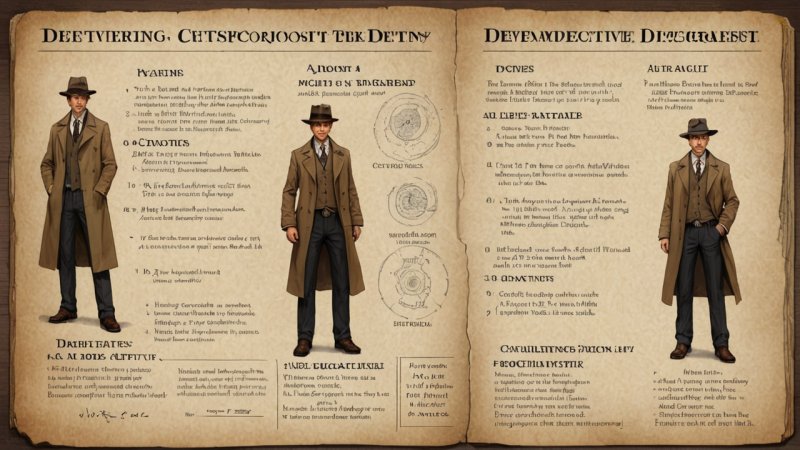Writing a detective character that captivates readers is an art form that requires careful consideration of various traits and characteristics that define them. Whether your detective is an amateur sleuth or a seasoned professional, certain qualities can elevate their role in the narrative. By focusing on these traits, writers can create a character that not only engages readers but also serves as a mirror to the moral complexities of crime.
The first crucial trait of a compelling detective is intelligence. A detective must possess a keen mind capable of analyzing complex information, making connections, and solving puzzles. This intelligence can manifest in various forms, such as analytical thinking, street smarts, or even emotional intelligence. A detective who pays attention to subtle nuances in dialogue or body language can unravel clues that others overlook. This not only makes for a thrilling reading experience but also establishes the detective as a formidable figure in the story.
Next, a strong sense of justice is essential for any detective character. This trait often drives their motivations and decisions throughout the investigation. A detective who believes in justice, even in the face of personal or professional challenges, resonates with readers who share a similar value system. This conviction can lead them to take risks, challenge authority, or confront their own biases, creating a rich narrative arc that explores themes of morality and ethics.
Moreover, vulnerability plays a significant role in character development. A detective who grapples with personal struggles, such as grief, addiction, or past failures, adds depth and relatability to their character. These vulnerabilities can serve as obstacles that hinder their progress or lead to moments of introspection and growth. For example, a detective haunted by past mistakes might be motivated to seek redemption, creating a powerful emotional journey that readers can invest in.
Additionally, interpersonal skills are vital for a detective character. They must navigate complex relationships with suspects, informants, and colleagues, often balancing empathy with skepticism. A detective’s ability to read others and establish rapport can significantly impact their investigations. Characters who excel in communication can extract vital information through interviews and interrogations, making them feel more dynamic and engaging.
Furthermore, quirks and eccentricities can make a detective memorable and distinctive. From unique hobbies to peculiar habits, these traits can add flavor to the character’s personality. For instance, a detective who collects rare stamps may use this hobby as a metaphor for their investigative tendencies, creating thematic resonance throughout the story. These quirks not only make the character more relatable but also provide opportunities for humor and levity in an otherwise tense narrative.
Lastly, adaptability is an essential trait for any detective. The ability to think on their feet and adjust their strategies in the face of unexpected developments is crucial in the world of crime-solving. A detective who can pivot quickly, reassess situations, and innovate solutions keeps the plot engaging and unpredictable. This adaptability can also highlight the character’s growth and evolution as they confront increasingly complex challenges.
In conclusion, crafting a compelling detective character requires attention to key traits such as intelligence, a strong sense of justice, vulnerability, interpersonal skills, memorable quirks, and adaptability. By weaving these characteristics into your detective, you create a multidimensional figure that resonates with readers and enhances the mystery or thriller narrative. Ultimately, a well-crafted detective character not only drives the plot but also invites readers to explore the moral complexities of crime and justice.
Key Traits of Compelling Detective Protagonists
Explore the essential traits that make detective protagonists compelling and relatable in mystery and thriller narratives.






